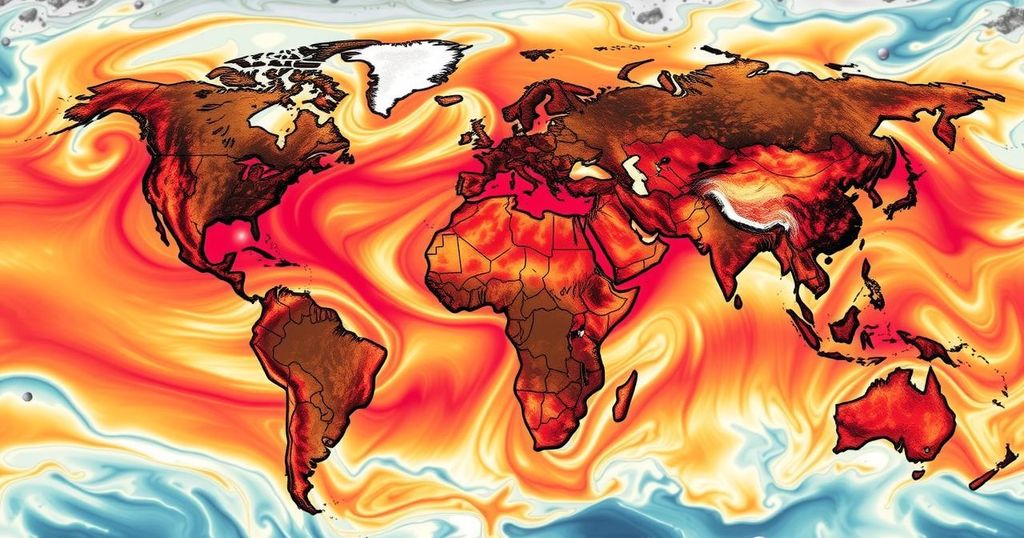Weather
AARON FAVILA, ANDY WONG, AP, ASIA, ATHENS, BEIJING, CENTRAL, CHINA, CLIMATE, CLIMATE CHANGE, COUNTY HOMELESS TRUST, CROSS, CUBA, EUROPE, FELIX MARQUEZ, GLOBAL WARMING, GREECE, LYNNE SLADKY, MIAMI - DADE COUNTY HOMELESS TRUST, NORTH AMERICA, PARTHENON, PHILIPPINES, PRIZES, QUEZON CITY, WEATHER
Oliver Grayson
0 Comments
2024 Marks Extreme Heat Surge Due to Climate Change Effects
In 2024, climate change resulted in an average of 41 extra days of dangerous heat globally, significantly impacting millions of lives. This year was linked to numerous extreme weather events that resulted in fatalities and displacement. Researchers emphasize the urgent need for global action to mitigate climate change effects, particularly as the planet nears critical warming thresholds established by international agreements.
In 2024, human-induced climate change resulted in an alarming increase of 41 days of dangerous heat experienced across the globe, based on research by climate scientists. This data aligns with the broader pattern of intensifying climate anomalies observed this year, making it one of the hottest years on record. Furthermore, the impact of climate change exacerbated various extreme weather events throughout the year, affecting millions and resulting in numerous fatalities.
Climate altercations this year have primarily contributed to severe heatwaves in numerous regions, including Northern California, Mexico, and West Africa, where vulnerable populations faced dire consequences. Additionally, southern Europe experienced a significant rise in temperatures, prompting significant cultural sites like the Acropolis in Greece to close temporarily. The interconnection between climate change and extreme weather has been highlighted, demonstrating that rising temperatures potentially correlated with more destructive weather phenomena, such as heavy rainfall and droughts, worldwide.
The increase in extreme heat days was calculated by comparing current global temperatures with the expected average temperatures in a scenario devoid of climate change influences. This analysis, although not yet peer-reviewed, is rooted in peer-reviewed methodologies that have previously demonstrated the substantial effects of climate change. Some regions endured over 150 days of extreme heat; the most underprivileged countries bore the largest impact.
Experts voiced a serious concern regarding the fatalities associated with heatwaves, which are often underreported. “Heat waves are by far the deadliest extreme event, and they are the extreme events where climate change is a real game changer,” stated Friederike Otto, the lead of World Weather Attribution. The year 2024 serves as a critical warning, indicating that the Earth is perilously close to breaching the Paris Agreement’s 1.5-degree Celsius limit on global warming.
Investigating 29 extreme weather events that resulted in over 3,700 deaths and significant displacement, researchers found a direct correlation between 26 of these events and climate change. Although the El Niño phenomenon exacerbated certain conditions, the prevailing consensus is that climate change played a more significant role in these occurrences, leading to destructive storms and record-breaking rainfall.
In conclusion, without comprehensive action to mitigate climate change, scientists predict an escalation of such extreme weather patterns. It is asserted that despite the daunting realities presented by climate change, strategic preparation and adaptation efforts at the national and global levels may reduce its adverse effects on vulnerable populations.
Ultimately, the findings underscore the urgent need for global cooperation to transition away from fossil fuels and implement effective climate initiatives to combat the widespread impacts of climate change.
The urgency of addressing climate change has never been clearer, as evidenced by the rising global temperatures and the increase in extreme weather events. In 2024, climate scientists observed a marked rise in dangerous heat days around the world, attributed primarily to human activity linked to fossil fuel combustion. This phenomenon highlights the evolving nature of climate-related threats, revealing that without immediate global action, vulnerable populations worldwide will continue to face severe consequences.
The revelations from 2024 portray a stark reality regarding the impacts of climate change, accentuated by the record-breaking heat and related extreme weather events that have resulted in tragic loss of life and livelihood. Concerted international efforts to mitigate climate change impacts are crucial, emphasizing the global responsibility to adapt and reduce carbon emissions. Without decisive action, the outlook remains grim for both the planet and its inhabitants, underscoring the immediate need for effective climate strategies.
Original Source: apnews.com




Post Comment